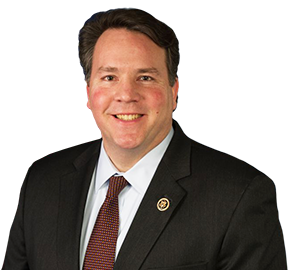WASHINGTON, DC – Recently, Rep. Alex X. Mooney introduced H.R. 8153, the Bank Risk Reduction Act, to eliminate regulations that hinder bank risk management and create systemic risk. Specifically, this legislation eliminates Dodd-Frank’s mandatory margin, or collateral, requirements with respect to interest rate swaps that hedge interest rate risk of bank assets.
Interest rate risk is the likelihood of a decline in the value of a bond resulting from changes in interest rates. When interest rates rise, bond prices usually fall. This legislation responds to the bank failures of early 2023, where interest rate risk was not properly managed.
The failure to hedge can be traced back to Dodd-Frank regulations, which unwisely require banks to post margin when entering into interest rate swap contracts for the purposes of hedging against interest rate risk. Interest rate swaps are contracts between two parties, like banks, which agree to exchange interest rate payments to manage interest rate risk. Margin requirements create the risk of uncertain payments, which discourages banks from utilizing interest rate swaps as a tool to manage interest rate risk. A 2023 study found that “over three quarters of all reporting banks report no material use of interest rate swaps” and “only 6% of aggregate assets in the U.S. banking system are hedged by interest rate swaps.”
Two Financial Services Committee Republicans joined as original cosponsors: Reps. Byron Donalds (R-FL) and Andy Ogles (R-TN).
“Unfortunately, current government regulations stemming from Dodd-Frank discourage safe bank risk management.” said Rep. Alex X. Mooney. “While some are using a struggling financial sector to call for increasing capital requirements—which would only limit lending in rural West Virginia communities—we really should be using this opportunity to roll back reckless overregulation. That is exactly what my Bank Risk Reduction Act does by eliminating the government penalty on banks hedging against interest rate risk.”
This legislation is endorsed by Americans for Tax Reform and Americans for Prosperity.
“The collapse of Silicon Valley Bank was a result of overburdensome regulation and the Federal Reserve’s failure to properly supervise the bank. Since 2010, the Dodd-Frank Act has limited banks from hedging against changes in interest rates—as was the case when the Fed began raising rates in response to high inflation. Fortunately, Rep. Alex Mooney has introduced legislation to fix this,” said Grover Norquist, President of Americans for Tax Reform. “I am proud to support the Bank Risk Reduction Act, which will make it easier for banks to hedge against interest rate volatility. It will also ensure banks are transparent about the fair value of their long-term investments. These free-market reforms are needed to ensure that banks can hedge risk, but also allow shareholders, depositors, and bondholders to better understand a bank’s financial condition in real time.”
“The Bank Risk Reduction Act empowers financial institutions with more flexibility to proactively manage their risk exposure, enabling them to adapt swiftly and effectively to dynamic economic conditions. By fostering flexibility and resilience within the banking sector, particularly during times of economic uncertainty, the Act plays a pivotal role in promoting stability and safeguarding against systemic risks.” – James Czerniawski, Senior Policy Analyst, Americans for Prosperity.


